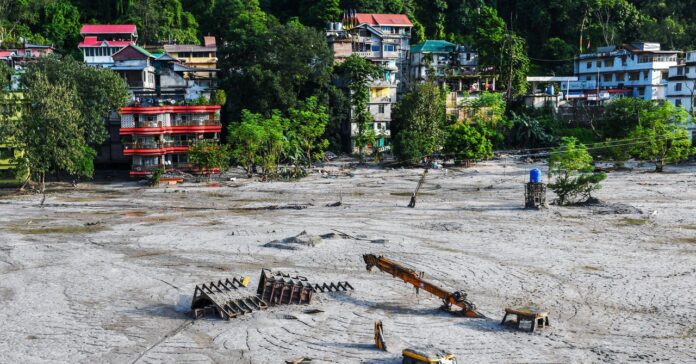Recognized officially as glacial lake outburst floods—or GLOFs—those deluges are pushed through emerging mountain temperatures. The place glaciers terminate, they deposit rocky particles that has been carried of their ice, forming what’s referred to as a moraine. From time to time, meltwater from the glacier gets trapped in the back of this particles, making a lake.
Everywhere in the international, glacier meltwater feeds mountain lakes, and as glacial ice recedes because of world warming, many of those our bodies of water are turning into higher and extra volatile. Rainfall, landslides, earthquakes, or emerging water force can all be catalysts to a moraine moving and crumbling, liberating a perilous wall of water down the mountain.
“We will establish the danger sizzling spots, however we will be able to’t expect when precisely a GLOF match will occur,” says Ashim Sattar, a Himalayan cryosphere scientist on the Indian Institute of Science. Greater than part of the 15 million other people considered in danger from glacial lakes reside in Top Mountain Asia, the high-altitude lands targeted across the Tibetan Plateau. India and Pakistan by myself account for over 5 million of the ones susceptible. Sikkim, specifically, is understood for lake outbursts, however a big chew of the Himalayan vary additionally has a historical past of devastating lake floods in Nepal and Bhutan.
Within the coming a long time, the danger gets worse. Glaciers “are very delicate to a warming local weather,” says Sattar. In a state of affairs the place the arena warms through 1.5 levels Celsius on reasonable, glaciers in Asia’s excessive mountains will heat through 2.1 levels, analysis estimates; world warming, fashions expect, could have an oversized impact on ice melting. For the reason that long term warming could be very prone to exceed 1.5 levels, a large number of bad meltwater goes to building up within the coming years.
Outbursts can occur with out caution, and getting ready for them is tricky. There are 9,575 glaciers within the Indian Himalayas by myself, and sustained melting has created greater than 5,000 glacial lakes with “probably volatile moraines”—banks vulnerable to bursting.
Tracking the elements and water ranges at a lake may give an early caution of an outburst, however putting in place tracking stations is time-consuming and dear. Plus, such measures received’t avert a flood. “So far as I do know, siphoning off the water or controlled breaching of the moraine dyke is the one approach to ease the force [of a lake at risk of bursting],” says Dhrupad Choudhury of the Global Centre for Built-in Mountain Construction (ICIMOD) in Patan, Nepal. “The similar idea is utilized in dams right through monsoon.”





 #shorts #shortsfeed #nature #youtubeshorts #iciness
#shorts #shortsfeed #nature #youtubeshorts #iciness